Race
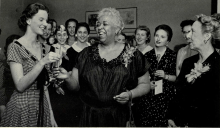
Whatever faults Black Protestantism has had, its grand strength is in its exercise of democratic debate internal to black Americans about the meaning of the good life and who gets a say in the shaping of that life, including perspectives from other faiths.
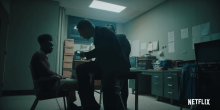
I watched Ava DuVernay’s Netflix series When They See Us and found myself angered by the people and systems that had a role in the incarceration of five innocent boys. The Central Park Five, Raymond Santana, Kevin Richardson, Antron McCray, Yusef Saalam, and Korey Wise, were wrongfully convicted and later exonerated of a variety of charges related to the rape and assault of a white female jogger in 1989. While the series itself honors the stories of the Central Park Five, in choosing to title the series When They See Us, DuVernay invites us into a broader conversation on the criminalization and mass incarceration of young boys and girls of color, and challenges us to define our own role within this system.
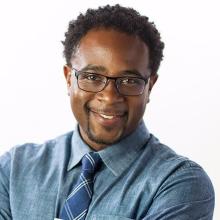
White evangelical support for Donald Trump has led some black evangelicals to a crisis of faith and ecclesial identification. In this moment, Jemar Tisby has risen as a voice that’s unafraid to challenge white evangelicals’ complicity with racism, forging another path for those feeling alienated. Tisby is currently completing his PhD in history at the University of Mississippi. He is the president of The Witness: A Black Christian Collective, previously known as the Reformed African American Network, and writes widely about racism, the American church, and social justice. In 2017, a New York Times article quoted him saying: “Racism is not a ‘blind spot’ within white evangelicalism. It is part of that tradition’s DNA.” Now, Tisby has published a book tracing that DNA by way of history.

Last week, the world was introduced to John Allen Chau, the U.S. American “adventurer” and missionary who was killed by an indigenous group on North Sentinel Island. According to a statement from missionary organization All Nations, Chau was a “seasoned traveler who was well-versed in cross-cultural issues” and had “previously taken part in missions projects in Iraq, Kurdistan and South Africa.” Now, Indian police have begun the dangerous mission of trying to recover the body even though a tribal rights group has urged officials to call off the search, claiming it puts them and the indigenous group in danger.

Earlier this week, journalist Yamiche Alcindor asked Donald Trump about whether his rhetoric — and that of his party — emboldened white nationalists. Trump responded, "That's such a racist question." This happened on the same day in which a prominent white nationalist leader posted pictures of himself parading on the White House lawn.
Trump’s response follows a trend. When a reporter asked about his rhetoric contributing to violence, he said: “You're creating violence by your question.” When asked about the offensive ad that he ran in the lead up to the midterms, Trump replied, “Your questions are offensive.”
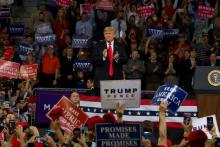
A new study published in Christianity Today claims to debunk dominant narratives around the 81 percent of white evangelicals who voted for Donald Trump in 2016. New York Times columnist David Brooks shared it and concluded: “Many Evangelicals voted for Trump, reluctantly, because of economics and health care more than abortion and social issues.” If this sounds too good to be true, it’s because it is.

ProPublica has released a new interactive database that allows users to examine racial disparities in more than 96,000 individual public and charter schools, and 17,000 districts across the United States.
You can search the racial composition of individual schools and also compare school districts on issues of opportunity, discipline, segregation, and achievement gap.
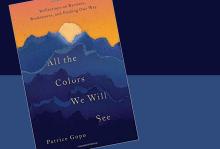
EQUAL PARTS brilliant imagery and candid reflection, All the Colors We Will See is a story on becoming. With vivid attention to detail and a deep reservoir of wisdom, Patrice Gopo has carefully crafted a collection of essays on love, loss, and longing.
This story begins in the 1980s, weaving together layers of identity formation as we learn Gopo’s background as the daughter of Jamaican immigrants and explore her adolescent upbringing in Anchorage, Alaska. Throughout this book Gopo intimately relays her difficulties as a constant minority—African American with some East Indian heritage—often lacking cultural peers in her evolving spaces. From witnessing the acquittal of O.J. Simpson at her predominantly white high school to finding black community at Carnegie Mellon University to meeting the love of her life in Cape Town, South Africa, we are taken on a journey of self-discovery and self-acceptance.
This book is not merely reflection. It is a deeper introduction to the complex intersection of race and immigration and how these can inform one’s developing sense of self. Time and time again, Patrice Gopo lives into an identity as an “other,” struggling to find her fit.
“‘I don’t really think of you as being black,’ a dear college friend once said to me,” Gopo writes. “I held the phone against my ear and paused a moment as mild indignation crept through my mind. ‘Of course I’m black,’ I replied.”

In America’s children, we often see hope for a better future, especially when it comes to reducing racism. Each new generation of white people, the thinking goes, will naturally and inevitably be more open-minded and tolerant than previous ones. But do we have any reason to believe this? Should we have faith that today’s white kids will help make our society less racist and more equitable? Previous research has had mixed findings. So in order to explore more fully what white kids think about race, I went straight to the source: white children themselves.

This is the burden of black women who carry the cargo of worshipping Jesus under the leadership of sexist men. This is the heavy load that Aretha carried throughout her life – being ostracized by men for singing the “devil’s music” while clinging desperately to the message of her father’s teaching. Throughout her life, Aretha paid her tithes and offerings to churches that failed to embrace her full humanity. They elevated the perception of her unholy ways while accepting those checks.

Editors’ note: This article appeared in Sojourners magazine in 2018. In 2020, a Washington Post article by Will Hobson raised concerns about some of Bennet Omalu’s conclusions on chronic traumatic encephalopathy (CTE). Ongoing research suggests that CTE is a risk for NFL players, but the rate and severity of the brain disease among football players is still being studied.
DR. BENNET OMALU is well-acquainted with gruesome deaths. “Some people wake up in the morning, put on their suits, go to offices, and to do things associated with life, with living. But me,” Omalu says from behind the office desk in his Sacramento-area home, “I dress up, I go to work to do things associated with the greatest weaknesses of [humanity].”
A forensic pathologist and neuropathologist who earned degrees in his native Nigeria and in various schools across the U.S., Omalu was most recently in the news for performing an independent autopsy on Stephon Clark, an unarmed black man killed in his own backyard. Omalu’s work confirmed that Clark was shot in the back six times by Sacramento police.
Omalu is best known, however, for the startling discovery he made after performing an autopsy on former NFL player Mike Webster. As chronicled in the 2015 film Concussion, with Will Smith starring as Omalu, the then-medical examiner in Pittsburgh found Webster had chronic traumatic encephalopathy, a degenerative brain disease caused by repeated blows to the head—the kind of blows to the head you ought to expect when playing tackle football.
But despite his daily proximity to death, Omalu, a committed Catholic, has nothing but gratitude. “I am blessed because I encounter death every day ... I came to the world naked, cold, and lonely, and I will leave the world alone, cold, and lonely,” he explains. “When you realize that, you begin to think of powers, realities, dimensions that are beyond you.”
Omalu is precise and careful with his words. When he says, “I let the Spirit of God percolate into my being,” I half expect to hear his celestial brew bubble. “Everything I do, I do through the eyes of faith.”
Omalu doesn’t seem to be exaggerating; his Christian beliefs and morals permeate his outlook on everything. Early in our conversation, he asks if I’m a Christian writer, and I try to say I’m more like a Christian who writes, but Omalu isn’t one to thread the needle between competing postmodern definitions of Christian vocation. The Bible on his desk is as important to him as any medical textbook—and based on its proximity to his laptop, he might use the Bible more often.
And it’s with this same precision that Omalu offers an uncompromising assessment of the sport running U.S. recreational life each Saturday and Sunday (plus Monday nights on ESPN, Fridays if you’re in high school, and it’s even trying to make Thursdays a thing) for about six months out of the year.
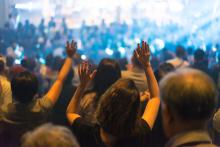
In much of the last century, American Evangelicalism has had a complex relationship with power. On one hand, it has felt itself marginalized and repudiated, defeated, and silenced. On the other, it has often seemed to seek — even fawn over — worldly power, mimicking in the church forms of power evident in our culture. (I remember being at a conference where it was announced we should all be back after dinner for “an evening of star-studded worship.”) An evangelical dance with political power has been going on from the time of Billy Graham, through the Moral Majority and the religious right, to the Tea Party, and most recently with the white evangelical vote—the result being, as honorary Chairman of the Lausanne Movement Doug Birdsall has said, “When you Google ‘evangelical,’ you get Trump.”
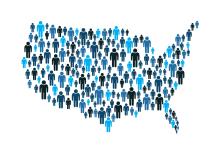
An inaccurate census means more than a mistaken count of the U.S. population: Census data not only determines how many congressional districts each state gets, it also often determines the disbursement of federal funds. Urban, lower-income areas with a high population of immigrants and people of color are often the most affected by undercounting and the lack of funding that comes with it.

Another issue that we know: In a number of states, pregnant women, when they give birth in the midst of their sentences, they’re forced to be shackled to a gurney in the midst of their delivery process. We know being born into that stress-induced state has irreversible cognitive impacts on the child, but we still haven’t changed the law in light of that.
9. My Book Is About Race. Of Course It Is.
“Now my world is still on fire, but people keep applauding my ability to describe the flames.”
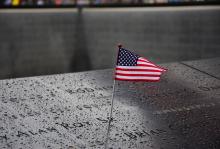
While much will hinge on the motives of a white gunman attacking a mostly-white country music crowd, that uncomfortable question also hits at some of America’s most divisive issues: race, religion, and politics.

In the midst of a raging discussion about what it means to be American, it is worthwhile to reflect on the profound ambivalence of American civil religion — perhaps the most powerful force for creating a shared national identity.
In 1967, Robert N. Bellah’s seminal essay, “Civil Religion in America,” created a template for how both the right and the left defined civil religion to cultivate a sense of belonging, particularly in an era of turbulence. During this period of increasing polarization, Bellah’s words are more relevant than ever.

For the brilliant theologians who teach and research at seminaries or divinity schools, part of their work is training the next generation of future pastors for church leadership. Catholic and many Protestant church leaders have received a thorough theological education (though not all). They possess Masters and Doctoral degrees that solidify their ability to grasp the tenets of theology. But for those theologians interested in changing the world for the better, they must offer work that is easily understood by the masses, especially the marginalized population they are seeking to assist.
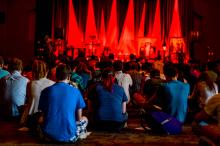
Participants joined with local religious leaders and city residents to walk through the city, stopping at various places of worship to sing and pray, in a demonstration of unity. The Walk of Trust ended on the campus of Saint Louis University, where Archbishop Robert Carlson of St. Louis, who first conceived of the meeting, spoke alongside the Rev. Dr. Traci Blackmon, a pastor in Florissant, Mo., and a leading voice in the response to Michael Brown’s death.

Someone lied. It’s more acceptable to say, “You’ve been bumped because the flight is overbooked,” than to say, “You’ve been bumped because we want your seat to fly our staff. That lie led to violence. Violence led to trauma for passengers, for millions of viewers, and for United, which sustained a $1.4 billion dive in stock value by Tuesday morning and now seems rested at a $255 million loss.